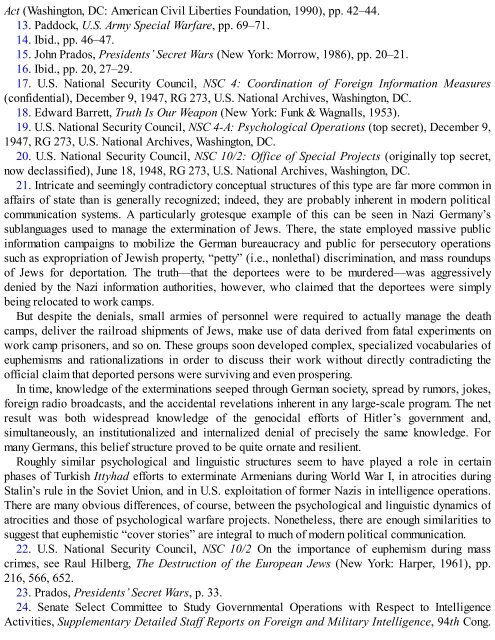9842659846
Create successful ePaper yourself
Turn your PDF publications into a flip-book with our unique Google optimized e-Paper software.
Act (Washington, DC: American Civil Liberties Foundation, 1990), pp. 42–44.<br />
13. Paddock, U.S. Army Special Warfare, pp. 69–71.<br />
14. Ibid., pp. 46–47.<br />
15. John Prados, Presidents’ Secret Wars (New York: Morrow, 1986), pp. 20–21.<br />
16. Ibid., pp. 20, 27–29.<br />
17. U.S. National Security Council, NSC 4: Coordination of Foreign Information Measures<br />
(confidential), December 9, 1947, RG 273, U.S. National Archives, Washington, DC.<br />
18. Edward Barrett, Truth Is Our Weapon (New York: Funk & Wagnalls, 1953).<br />
19. U.S. National Security Council, NSC 4-A: Psychological Operations (top secret), December 9,<br />
1947, RG 273, U.S. National Archives, Washington, DC.<br />
20. U.S. National Security Council, NSC 10/2: Office of Special Projects (originally top secret,<br />
now declassified), June 18, 1948, RG 273, U.S. National Archives, Washington, DC.<br />
21. Intricate and seemingly contradictory conceptual structures of this type are far more common in<br />
affairs of state than is generally recognized; indeed, they are probably inherent in modern political<br />
communication systems. A particularly grotesque example of this can be seen in Nazi Germany’s<br />
sublanguages used to manage the extermination of Jews. There, the state employed massive public<br />
information campaigns to mobilize the German bureaucracy and public for persecutory operations<br />
such as expropriation of Jewish property, “petty” (i.e., nonlethal) discrimination, and mass roundups<br />
of Jews for deportation. The truth—that the deportees were to be murdered—was aggressively<br />
denied by the Nazi information authorities, however, who claimed that the deportees were simply<br />
being relocated to work camps.<br />
But despite the denials, small armies of personnel were required to actually manage the death<br />
camps, deliver the railroad shipments of Jews, make use of data derived from fatal experiments on<br />
work camp prisoners, and so on. These groups soon developed complex, specialized vocabularies of<br />
euphemisms and rationalizations in order to discuss their work without directly contradicting the<br />
official claim that deported persons were surviving and even prospering.<br />
In time, knowledge of the exterminations seeped through German society, spread by rumors, jokes,<br />
foreign radio broadcasts, and the accidental revelations inherent in any large-scale program. The net<br />
result was both widespread knowledge of the genocidal efforts of Hitler’s government and,<br />
simultaneously, an institutionalized and internalized denial of precisely the same knowledge. For<br />
many Germans, this belief structure proved to be quite ornate and resilient.<br />
Roughly similar psychological and linguistic structures seem to have played a role in certain<br />
phases of Turkish Ittyhad efforts to exterminate Armenians during World War I, in atrocities during<br />
Stalin’s rule in the Soviet Union, and in U.S. exploitation of former Nazis in intelligence operations.<br />
There are many obvious differences, of course, between the psychological and linguistic dynamics of<br />
atrocities and those of psychological warfare projects. Nonetheless, there are enough similarities to<br />
suggest that euphemistic “cover stories” are integral to much of modern political communication.<br />
22. U.S. National Security Council, NSC 10/2 On the importance of euphemism during mass<br />
crimes, see Raul Hilberg, The Destruction of the European Jews (New York: Harper, 1961), pp.<br />
216, 566, 652.<br />
23. Prados, Presidents’ Secret Wars, p. 33.<br />
24. Senate Select Committee to Study Governmental Operations with Respect to Intelligence<br />
Activities, Supplementary Detailed Staff Reports on Foreign and Military Intelligence, 94th Cong.









![Genki - An Integrated Course in Elementary Japanese II [Second Edition] (2011), WITH PDF BOOKMARKS!](https://img.yumpu.com/58322134/1/180x260/genki-an-integrated-course-in-elementary-japanese-ii-second-edition-2011-with-pdf-bookmarks.jpg?quality=85)
![Genki - An Integrated Course in Elementary Japanese I [Second Edition] (2011), WITH PDF BOOKMARKS!](https://img.yumpu.com/58322120/1/182x260/genki-an-integrated-course-in-elementary-japanese-i-second-edition-2011-with-pdf-bookmarks.jpg?quality=85)





